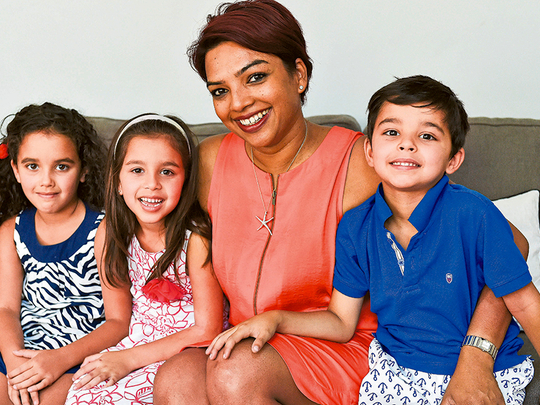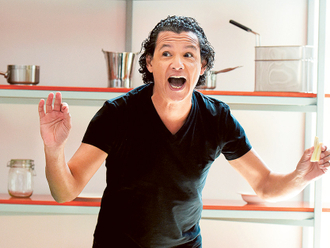
Dubai: Two of a kind, peas in a pod, cut from the same cloth... phrases twins and multiples hear too often. In Dubai, the number of twins and multiples has been growing over the past six years. The Dubai Gynaecology and Fertility Centre reported 52 twins and six triplets in 2015, and 53 twins and five triplets in 2014 (through IVF).
However, when looking at statistics covering the whole of Dubai, a total of 963 twins, triplets and multiples were born in both public and private hospitals in the UAE in 2010.
The number slightly increased to 967 sets of twins born in 2011, and was on the rise again in 2012, with 1,112 twins and multiples.
For parents of multiple-birth babies, twins, triplets or more, the journey of parenting can offer entirely different challenges and the UAE has associations and groups such as TwinPlus Arabia, where twins and multiples can interact, participate in activities, and share their stories, challenges, and experiences.
New mothers with multiple babies can also benefit from this group, by understanding how to meet the challenges of juggling responsibilities with two or more newborns and understanding the best ways to manage their time.
Gulf News talked to mothers of twins and triplets about what it takes to bring them up.
Rebecca Bear, German, 31
First-time mother Rebecca Bear, 31, from Germany, who has four-month-old twins she calls a “blessing”, said the joys of having twins are hard to describe. “You stand in front of the cot they are sharing and you don’t know which one to look at first.”
Her twin boys, Severiano James Bear and Tito Juan Bear, were born 16 minutes apart at Al Zahra Hospital in Dubai through a natural birth.
“Seve is relaxed and TJ is the little cheeky younger brother, who likes to squeak a little bit more just to get our attention, even if there is nothing wrong,” said Bear.
The first-time parents were shocked to find they were having twins. “When the doctor first said we were expecting a baby, we were very happy. When she said, “Look, there are two babies” we just looked at each other and started laughing out loud. We will never forget that moment,” said Bear.
The Bears decided to not find out the gender of their babies and up until the 38th week of the pregnancy, they wondered whether it would boys or girls. “Neither of us has twins in the family which makes it even more ‘meant to be’ to have our two [boys],” said Bear.
The parents spend as much time as possible with each baby, making sure they alternate and swap the babies during feeds and cuddles.
“Even though the hard work is non-stop, I wouldn’t change having twins for the world. I am so grateful the boys are healthy and [they are] the biggest joy in our lives. Even when they wake up at the same time at night, both crying, both with dirty nappies, both hungry.”
And she does not begrudge her total average sleep time of “anything between two-five hours of sleep [spread out over the day]. Every minute more than that is a bonus,” said Bear.
With her hands always full with either feeding, burping, or changing the babies, Bear and her husband take turns to regularly refill the changing station with essentials and get the twins’ baths ready. “There is no such thing as ‘the end of a long day’ because then the night shift follows,” said Bear. Another challenge is making sure both babies are content. “Which baby to attend to first, is still challenging at this stage.”
She does get asked the usual, “Who is your favourite?” There is no answer to that question, she said. “It is almost like they are one. They belong together, there is no one better than the other.”
Lala and Rupert Langtry White, British, both 34, four children
She found out she was having twins during the sixth week of her pregnancy.
Descrbing them as “miracles”, Lala Rupert Langtry, mother of the now 11-month-old identical twins, Digby and Arto, remembers telling her doctor that twins don’t run in her family.
Langtry pointed out that identical twins are not hereditary, and are not explained by a specific genetic cause. “The chance of having identical twins is 1 in 250 or about 0.5 per cent. Mine are monochorionic, diamniotic twins (or MoDi twins) — identical twins that shared placenta in utero,” she said.
After the shock of being told that she was carrying twins had settled, Langtry started to panic about something going wrong and robbing her family of this incredible blessing. She soon found out she had Twin to Twin Transfusion Syndrome (TTTS). Twin to twin transfusion syndrome (TTTS) is a disease of the placenta (or afterbirth) that affects identical twin pregnancies. “I knew that TTTS affected approximately 10-15 per cent of monochorionic pregnancies and although I knew it would be part of my check-ups, I wasn’t overly worried as I knew a few friends with identical twins who had all been fine,” she said.
At 13 weeks, Langtry was diagnosed with stage two (out of 5 stages) of TTTS. She was told that the condition is fatal in 90 per cent of cases without treatment, which is laser ablation surgery. Langtry needed to reach the 17th week of her pregnancy in order to undergo the laser surgery.
“It was a really scary time made harder by the fact that, at the time, the surgery was only available overseas. Luckily, the first laser lab has now opened in the UAE at The Corniche Hospital in Abu Dhabi under the expert care of Leanne Bricker, who cared for and delivered the twins,” said Langtry.
After almost a year, Langtry said the joy of having twins lies in the simple daily moments “like waking up to two little smiling faces, having a double armful of cuddles, watching them interact and love one another, and being part of this awesome club of amazing mothers of multiples”.
The challenges, however, appear when it comes to keeping a balance between the two babies and attending to their needs equally.
“Challenges include tandem breastfeeding, financial implications, and the times when one gets ill and the other follows,” she said.
Also a mother to a five-year-old boy, Wilbur, and a three-year-old girl, Loveday, Langtry said it is sometimes tough on her other children as the twins demand so much of her time.
“Everything is different. With Wilbur and Loveday, I practised attachment parenting; wearing them in a wrap sling, co-sleeping, feeding on demand. With the twins, I found I needed to have a strict routine in order to function,” she said.
“Getting to watch siblings interact is very special but watching identical twins grow together is another level of privilege entirely,” said Langtry.
Suman Manning, 41, Indian, mother of triplets
“We found out we were having triplets at my first scan at eight weeks,” said Dubai resident Suman Manning, 41, from Bengaluru.
Holding hands and awaiting the good news at the clinic, Manning and her husband were thrilled when, during the scan, the doctor pointed at another dark spot on the screen and said, “There is your second one.”
“My eyes widened and I grinned as I had always wanted twins. My husband’s grip on my hand tightened. Then the doctor said, ‘When it rains it pours, there is your third,’” said Manning,
Shocked, Manning felt her husband’s grip loosen, heard a nurse calling for a chair as his legs turned to jelly.
The first-time parents were handed a photo of the scan, which showed “all three blobs”, as they sat in the clinic’s lounge for half an hour, gathering in the experience. “We laughed and cried all at the same time. It was indescribable,” recalled Manning.
Her triplets, all girls, Zoey, Zander, and Zara, turn six this April, and attend grade one at the Dubai English Speaking School.
“The triplets are fraternal and very different from one another. One of my girls has curly hair, like her dad, and the other two have straight hair like me.”
With Manning’s uncles being twins, the genes run in the family.
“My maternal grandmother had twins, who are my mum’s brothers. I have always been fascinated by my uncles.”
Creating a daily routine is important when raising multiples, said Manning. While her mother lends a hand with the triplets, Manning also has a live-in helper to assist. “Routine was vital in helping me save my sanity. The twins support group was also a huge help along with talking to other mums with triplets who helped me deal with a lot of issues that are unique to a triplets household,” she said.
Manning is also the Chair of the TwinsPlus Arabia group, a non-profit distributing association of over 1,000 families in the UAE.
“The group existed when I found I was expecting. I found it so supportive that when the group’s founder left, I was more than happy to ‘give back’ and take over,” she said.
Annamarie Mikaelian, 38, South African, four children
“Our house will always be a mess, but it will always be full of love.” That’s how Annamarie Mikaelian, 38, mother of four, including triplets, described the joy of having triplets.
The Dubai resident said while twins run in her family, she and her husband were shocked but happy to find out they were having triplets. “I couldn’t stop laughing even though I was suffering from horrible morning sickness,” she said.
Her two boys, Lian Berc and Eli Justin, along with baby girl, Arya Ingeline, were born on July 15, 2015.
Mikaelian said her family was in awe of this miracle from the beginning. “Yes, it’s not easy and some days I’m not making it, but these babies are truly a blessing for us and we would not change that for the world,” she said.
Also the mother of a four-year-old girl called Gabriella, Mikaelian said her biggest challenge is getting enough sleep. “The secret to success is sleep. I have one nanny during the day and one at night to help me manage.”
The Mikaelians also had to make a few adjustments before the arrival of the triplets. “We had to buy a new car, extra car seats, and we moved to a bigger house — and did I mention the number of diapers?” she said, laughing.
Her first pregnancy, Mikaelian realised, was a piece of cake.
“When I had my daughter, I thought it was really hard but now I look back and it was so easy compared to now,” she said.
Mikaelian is also a member of the TwinsPlus Arabia association.
“Just to know you are not alone is already great. The ladies in the group are wonderful and always helpful.”







